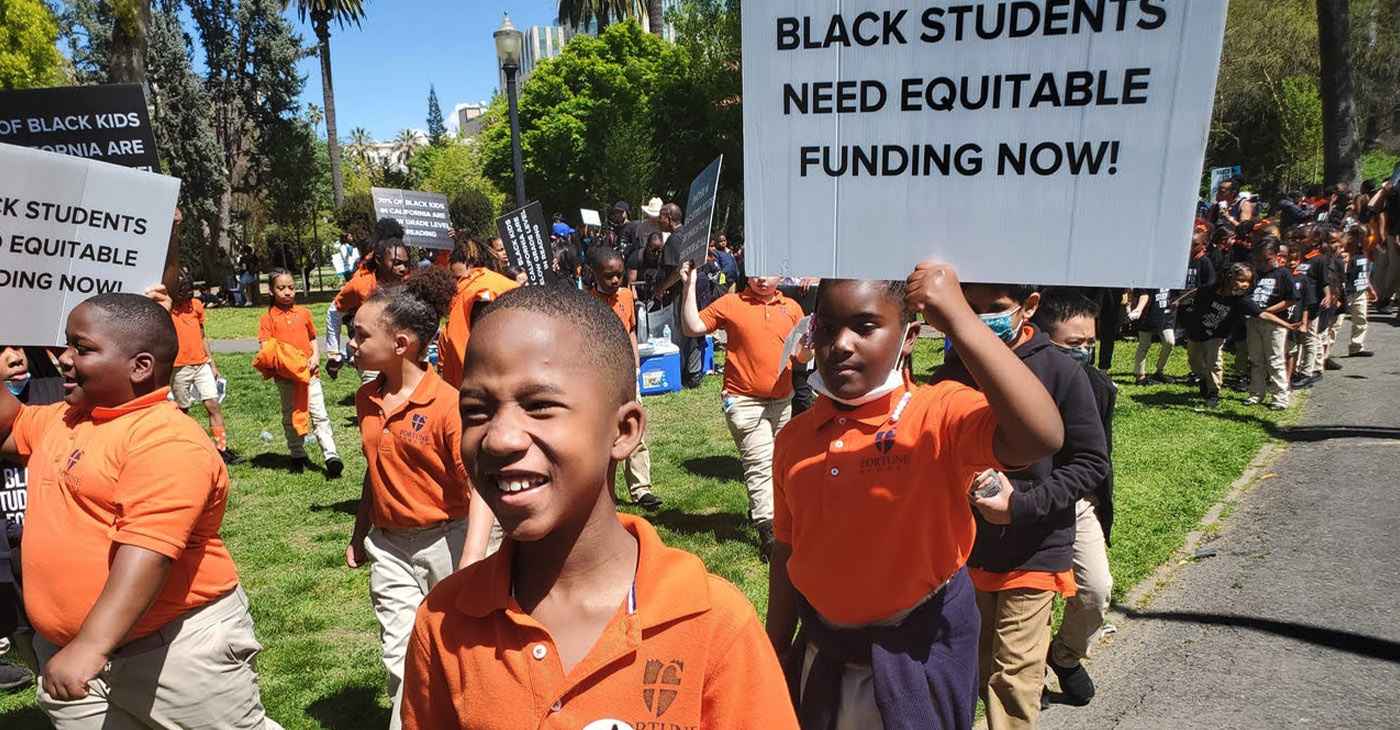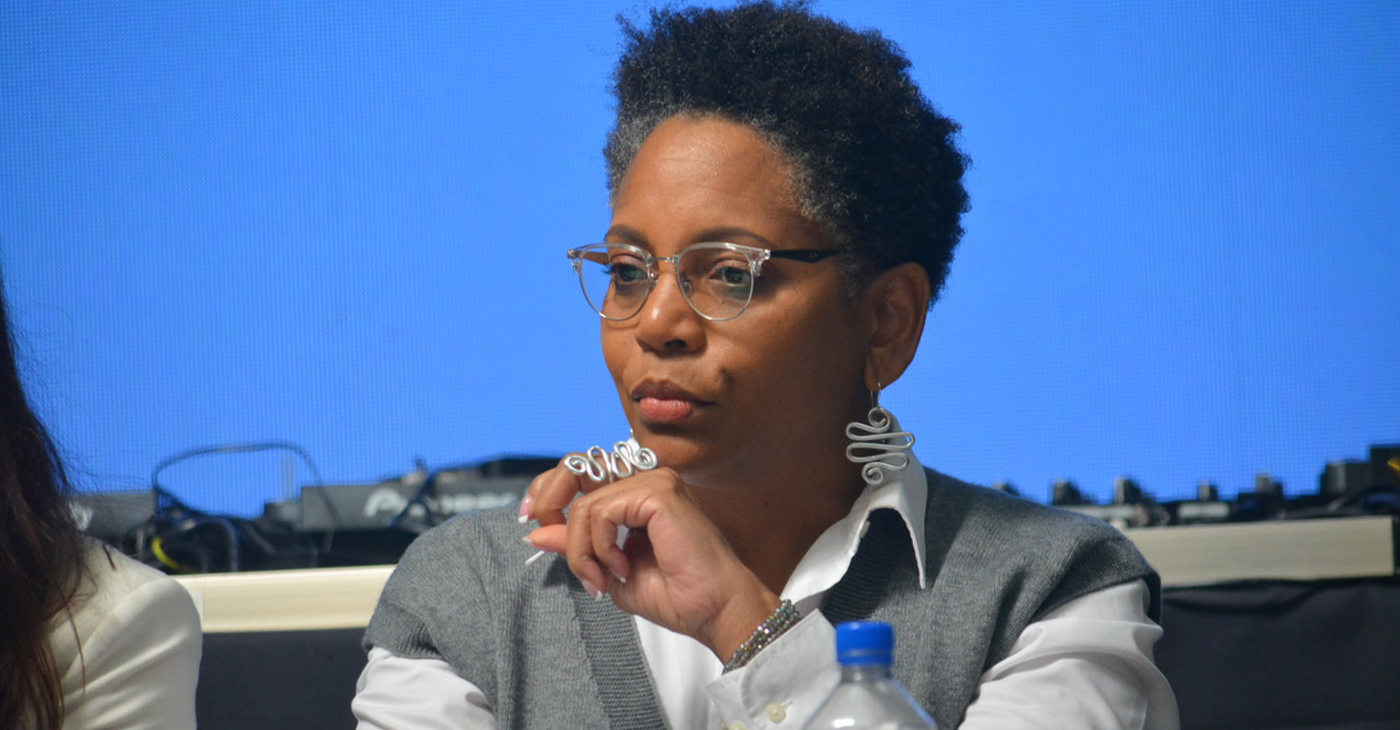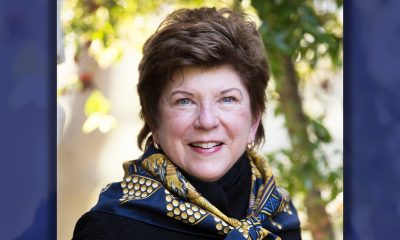California Black Media
Gov. Newsom and Advocates at Impasse Over Funding for Black Students Education
Last week, at the invitation of the Black in School Coalition (BISC), over 2,500 K-12 students, parents, education advocates, and civil rights leaders marched to the California State Capitol to demand increased funding for Black students in the state’s public schools. BISC is a statewide advocacy association consisting of 17 organizations from all parts of the education community, including teachers, administrators, local school districts and county board of education trustees, parents, civil rights, and faith groups.

Joe W. Bowers Jr. | California Black Media
Last week, at the invitation of the Black in School Coalition (BISC), over 2,500 K-12 students, parents, education advocates, and civil rights leaders marched to the California State Capitol to demand increased funding for Black students in the state’s public schools.
BISC is a statewide advocacy association consisting of 17 organizations from all parts of the education community, including teachers, administrators, local school districts and county board of education trustees, parents, civil rights, and faith groups.
The BISC marchers were calling on Gov. Gavin Newsom and the California Legislature to not move forward with the “Equity Multiplier” proposed in the governor’s Education Budget, which is supposed to be a substitute for Assembly Bill (AB) 2774 authored by Assemblymember Akilah Weber (D – La Mesa).
AB 2774 would have guaranteed funding for California’s lowest performing group, Black students, but advocates say, Newsom’s proposal falls short of that goal.
Because Newsom raised concerns that targeting funds to a specific group of students would violate Prop 209, which prevents preferential treatment based on race, Weber withdrew AB 2774. In exchange, Newsom agreed to increase funding for Black students under the Local Control Funding Formula (LCFF) in the 2023 budget.
The LCFF is a state law that provides funding to local school districts based on the needs of their students. California’s highest-needs student populations receiving supplemental funding for additional support are English Language Learners, low-income students, and children in foster care or homeless youth. However, despite chronic underperformance, Black students are not identified as a high-needs population for funding.
According to state data, in the 2021-22 academic year, 30% of California’s Black students met English standards and 15% met math standards, compared to 61% and 48% of White students meeting reading and math standards, respectively.
The equity multiplier proposal provides $300 million in ongoing Proposition 98 funding to the LCFF to accelerate gains in closing opportunity and outcome gaps. The funds are allocated to school districts with schools serving high concentrations of students eligible for free meals.
The equity multiplier is part of Newsom’s plan to overhaul how the state can hold districts and schools accountable for student performance, with particular attention to racial disparities. According to Newsom’s office, 95% of Black students in California will be impacted because they are enrolled in districts potentially facing new accountability requirements due to low performance.
Dr. Margaret Fortune, president and CEO of the charter school organization Fortune School of Education and the lead voice for BISC says Newsom’s proposal sounds good but does not reflect the intentions of Weber’s bill.
According to an analysis conducted by EdSource, the funding from Newsom’s proposal would benefit about 6% of Black students statewide and they would be receiving an estimated $18 million out of $300 million proposed. Overall, the proposal targets just 5% of students in the state in about 800 schools and the students reached in those schools are mostly Latino.
To address this disparity in funding for Black students not in low-income schools, BISC has developed an alternative plan to the Equity Multiplier. It proposes additional funding for any group not already funded that scores below the state average on any two metrics on the California School Dashboard. Based on this year’s dashboard results, Black and Native American students would qualify.
Because students who have received LCFF funding have shown progress and improved outcomes due to concentrated resources aimed at their improvement, BISC’s funding alternative intentionally provides Black students the additional support that has benefited high-needs student groups.
Prior to their march on the Capitol, members of the BISC and students provided public comments at the State Assembly’s education budget committee hearing in support of their alternative budget proposal.
Fortune suggested to the committee that the $300 million in the governor’s equity multiplier proposal be directed to student groups who perform below the state average on two or more state indicators on the California school dashboard. This would increase per-student funding from $713 under the governor’s proposal to $3,318 for students in California with the greatest academic needs.
Under the BISC alternative plan, an additional 81,617 Black students and 8,807 Native American students would be eligible for this funding, compared to an additional 22,699 Black students and 1,806 Native American students under Newsom’s proposal.
Christina Laster, Western Regional Education Director of the National Action Network, stated that not many Black students attend the low-income schools targeted by the governor’s equity multiplier. Instead, she recommends focusing on student groups who perform below the state average on two or more state indicators on the California school dashboard. This would target student groups in the most academic need based on their performance, not their race.
Dr. Ramona Bishop, CEO of ELITE Public Schools, urged the Legislators to consider the BISC alternative proposal for the equity multiplier, which would address the needs of the students who stood behind her as she spoke. She emphasized that all Black students in the state deserve care, attention, and the best efforts of those in power.
Izzy Gardon, a spokesperson for the governor said, “We share the ultimate goal of the Black in School Coalition to eliminate opportunity and achievement gaps for Black students. However, we continue to believe that our more comprehensive and legally sound proposal is a better option than AB 2774 and its related alternative proposal. We are not alone in that belief — as I believe you have seen, we have the support of members of the CLBC (California Black Legislative Caucus including Weber), CAAASA (California Association of African American Superintendents), the Superintendent of Public Instruction (Tony Thurmond) and many others.”
So BISC and Newsom are at an impasse at what is the best way to direct state funding for educating Black students in the public schools.
BISC wants funding targeting Black students based on their need for support due to poor academic performance, while Newsom’s Equity Multiplier focuses on schools with high concentrations of poverty, impacting about 6% of the state’s Black students.
Newsom is concerned about the legal implications of funding aimed at specific racial groups and aims to reform the LCFF to address underperforming racial groups. BISC, on the other hand, is focused solely on Black student funding and not on reforming LCFF.
But the California Department of Justice (DOJ) in a preliminary report it wrote for the Task Force to Study and Develop Reparation Proposals for African Americans recommended funding Black students through the state’s funding formula, suggesting that Newsom should not be so concerned about violating Prop 209.
A recent report from the Legislative Analyst’s Office complicates the debate by noting that high-poverty schools already receive targeted funding and recommending that the Legislature not approve funding for the Equity Multiplier.
Until a solution to the impasse is achieved, the state must persist in its efforts to identify and implement the appropriate policy to assist its Black students in improving their academic performance, based on their individual needs rather than their race.
Antonio Ray Harvey
Working Group: More Entry-Level Homes Could Help Solve Housing Crisis
The Community Housing Working Group hosted a briefing on April 23 at Cafeteria 15L in Sacramento. Discussions focused on how the housing crisis in California affects Black and Brown communities and explored ways to provide low-income families and individuals with affordable housing.

By Antonio Ray Harvey, California Black Media
The Community Housing Working Group hosted a briefing on April 23 at Cafeteria 15L in Sacramento. Discussions focused on how the housing crisis in California affects Black and Brown communities and explored ways to provide low-income families and individuals with affordable housing.
Tia Boatman Patterson, CEO and President of the California Communities Reinvestment Corporation, said “entry-level housing” is not available as it was in the past, adding that affordable units were a major point of entry into homeownership for many families in the Black community.
“My mother bought her first house when I was in junior high. It was an 850-square foot, two-bedroom and one-bathroom house in 1978. That house cost $30,000,” Boatman-Patterson said.
“A woman working part-time at JCPenney was able to afford that house. We don’t build these types of housing now. We do not build entry-level homeownership,” she added.
The Community Housing Working Group is a collection of diverse community organizations from across California working together to address housing challenges in their communities. The organization believes that solving the affordable housing crisis will require creating enough smaller, lower-cost, multi-family homes located near jobs, transit, and good schools.
The briefing included a panel discussion titled, “Exclusionary Zoning: A Look Back and a Path Forward.” Boatman-Patterson participated in that session along with Henry “Hank” Levy, Treasurer-Tax Collector for Alameda County, and Noerena Limón, consultant, Unidos U.S., and Board Member of California Housing Finance Agency.
Boatman-Patterson, a former Associate Director for Housing, Treasury and Commerce in the Office of Management and Budget for the Biden Administration, started her presentation by highlighting how exclusionary single-family zoning is contributing to continued segregation of California communities.
She said that single-family zoning originated in the Bay Area city of Berkeley in 1916.
“By creating single-family zoning and having fenced-off communities, you were able to exclude the ‘others,’” Boatman-Patterson said. “It really was a method to exclude — what they called ‘economic segregation’ — but that was a guise for racial segregation. Single-family zoning, along with redlining, became a systemic approach to exclude based on affordability.”
Title VIII of the federal Civil Rights Act of 1968 — commonly known as the Fair Housing Act of 1968 – is the U.S. federal legislation that protects individuals and families from discrimination in the sale, rental, and financing of housing. It was passed to open the doors to affordable housing.
In 1968, 65.9% of White families were homeowners, a rate that was 25% higher than the 41.1% of Black families that owned their homes, according to National Low-Income Housing Coalition. Today, those figures have hardly changed in the Black community, although White homeownership has increased five percentage points to 71.1%.
Boatman Patterson said the rate has not changed in Black and Brown communities because financing for affordable entry-level homes is almost nonexistent. The homeownership disparities contribute to the disturbing racial wealth gap in the nation, according to the National Low-Income Housing Coalition’s October 2018 report.
“We really must align the financing with the actual building of units, which we haven’t necessarily done. Because of this misalignment, I think we continue to see problems,” Boatman-Patterson said.
California Black Media
State Ed Chief Tony Thurmond Pushes Bill to Train Educators
State Superintendent of Public Instruction (SSPI) Tony Thurmond is advocating for comprehensive training for teachers in reading and math, emphasizing the urgent need to improve student academic outcomes across California. On April 24, during testimony in the Senate Education Committee, Thurmond backed Senate Bill (SB)1115, which aims to provide evidence-backed educator training. The committee passed the bill with a 7-0 vote.

By California Black Media
State Superintendent of Public Instruction (SSPI) Tony Thurmond is advocating for comprehensive training for teachers in reading and math, emphasizing the urgent need to improve student academic outcomes across California.
On April 24, during testimony in the Senate Education Committee, Thurmond backed Senate Bill (SB)1115, which aims to provide evidence-backed educator training. The committee passed the bill with a 7-0 vote.
Thurmond pointed out to the committee that existing funding for educator training in literacy and math only covers about one-third of California’s educator workforce. SB 1115, Thurmond said, would fund the remaining two-thirds.
“This is an issue of moral clarity,” according to Thurmond. “In the fifth-largest economy in the world, and in an age when we have access to substantial brain science about how students learn, it should be unacceptable to train only some educators in the best strategies to teach essential skills.”
SB 1115 incorporates multiple research-backed methods, including phonics, and it aligns with the California ELA/ELD Framework, which encourages biliteracy and multilingualism.
Thurmond emphasized the moral imperative behind the push for enhanced training by noting that 70% of incarcerated adults struggle with reading or are illiterate.
“Every child should feel supported as they learn to read and every teacher should feel confident in their ability to support students’ foundational literacy,” Thurmond said. “SB 1115 is about ensuring that all children have the opportunity to read by third grade, and that all children have a shot at the life-changing outcomes that come from early literacy.”
The next step for SB 1115 is a hearing in the Senate Appropriations Committee on May 6.
California Black Media
California Senators Alex Padilla and Laphonza Butler Back Local News Resolution
Last week, California U.S. Senators Alex Padilla and Laphonza Butler, both Democrats, announced their support for a resolution that recognizes the significance of local news. In the resolution dated April 23, Padilla and Butler joined Senator Brian Schatz (D-Hawai’i) and 10 other colleagues in designating April as “Preserving and Protecting Local News Month.”

By California Black Media
Last week, California U.S. Senators Alex Padilla and Laphonza Butler, both Democrats, announced their support for a resolution that recognizes the significance of local news.
In the resolution dated April 23, Padilla and Butler joined Senator Brian Schatz (D-Hawai’i) and 10 other colleagues in designating April as “Preserving and Protecting Local News Month.”
The resolution acknowledges that local news outlets are a public good essential to preserving America’s democracy.
“Millions of Americans count on the local news to help them understand what is happening in their neighborhoods and around the country. Yet local newsrooms have suffered from some of the harshest layoffs and budget cuts in recent years,” Butler said in a statement.
“It is critical that we recognize the role our local press plays in keeping people informed on the world around them,” she said.
The resolution comes at a crucial time in the media industry when employment decreased by 26% nationwide between 2008 and 2020, according to supporters of the bill. Employment in the newsroom came with great uncertainty as more than 30,000 jobs were lost in the last two decades.
Sen. Schatz said that local news helps increase civic engagement and strengthens democratic norms and practices. This resolution will help local journalists maintain healthy and vibrant communities through valuable storytelling.
-

 Community2 weeks ago
Community2 weeks agoFinancial Assistance Bill for Descendants of Enslaved Persons to Help Them Purchase, Own, or Maintain a Home
-

 Activism4 weeks ago
Activism4 weeks agoOakland Post: Week of April 3 – 6, 2024
-

 Business3 weeks ago
Business3 weeks agoV.P. Kamala Harris: Americans With Criminal Records Will Soon Be Eligible for SBA Loans
-

 Activism3 weeks ago
Activism3 weeks agoOakland Post: Week of April 10 – 16, 2024
-

 Community2 weeks ago
Community2 weeks agoAG Bonta Says Oakland School Leaders Should Comply with State Laws to Avoid ‘Disparate Harm’ When Closing or Merging Schools
-

 Community2 weeks ago
Community2 weeks agoOakland WNBA Player to be Inducted Into Hall of Fame
-

 Community2 weeks ago
Community2 weeks agoRichmond Nonprofit Helps Ex-Felons Get Back on Their Feet
-

 Community2 weeks ago
Community2 weeks agoRPAL to Rename Technology Center for Retired Police Captain Arthur Lee Johnson

















































